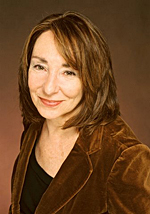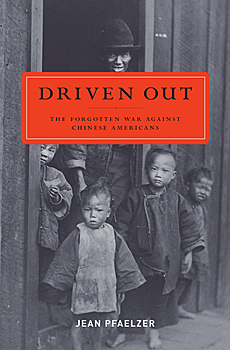During that period, Pfaelzer said, there were more than 200 roundups of Chinese Americans in the United States. In town after town, as races and classes were pitted against one another in the raw and anarchic West, Chinese miners and merchants, lumberjacks and field workers, prostitutes and merchants' wives, were gathered up at gunpoint and marched out of their homes, sometimes thrown into railroad cars along the very tracks they had built.
With vivid detail, Driven Out, published by Random House and now available on bookshelves, recounts unforgettable incidents such as the torching of the Chinatown in Antioch, Calif., and a series of lynchings in Los Angeles bizarrely provoked by a Chinese wedding. From the port of Seattle to the mining towns in California's Siskiyou Mountains, Pfaelzer documents how the first Chinese Americans were hanged, purged and banished.
Pfaelzer said that one of the most fascinating aspects of that troubled period of history is that Chinese Americans fought back. They filed the first lawsuits for reparations in the United States, sued for the restoration of their property, prosecuted vigilantes, demanded the right to own land and won access to public education for their children.
In order to starve out towns that tried to expel them, Chinese Americans organized strikes and refused to sell vegetables, Pfaelzer said. Further, they ordered arms from China and, with Winchester rifles and Colt revolvers, defended themselves.
In 1893, more than 100,000 Chinese Americans refused the government's order to wear photo identity cards to prove their legal status, which Pfaelzer said was the largest act of mass civil disobedience in United States history to that point.
Pfaelzer, who has been a member of the UD faculty since 1985, is a native of California who took a temporary teaching job at California State University at Humboldt in the early 1970s while she was finishing graduate school.
While at Humboldt, Pfaelzer said she “noted the absence of Asians in a community with an unusual mix of white, Latina and tribal students” and, upon inquiring, first learned of the brutal roundup and systematic “ethnic cleansing” of Chinese Americans in California and the Pacific Northwest beginning in 1848 and continuing through the second half of the 19th century.
Pfaelzer said she “was haunted by this disturbing and untold history that took place in an ethereally beautiful part of the country, a place where the redwoods meet the coast, a place that I return to each year.”
Other jobs followed, as Pfaelzer taught at University of California San Diego and wrote her first book, on the culture of hope and the dreams of utopian societies. She moved to Washington, D.C., working as director of the National Labor Law Center and then for a Democratic Congressman, analyzing immigration, labor and women's issues. She worked on the first versions of the Family and Medical Leave Act, and became a consultant for the organization of women coal miners. Subsequently, the mayor of the District of Columbia appointed her to the Washington Commission for Women.

However, Pfaelzer said she could not shake “the dissonance between the beauty of the land and people of California and this untold history of pogroms” and decided to bring the story up to date.
“The legacy of the purges is still troubling,” she said. “Today we are watching immigrants expelled from small towns across the United States, such as Hazelton, Pa., under a minor housing code. We see the lineage of laws denying the first Chinese Americans the right to testify in court or hold property in the proposed guest worker programs.”
With personal identity cards looming on the horizon for all Americans, Pfaelzer added, “I hope we have inherited the courage of the first Chinese Americans.”
Driven Out already has received much acclaim. Kevin Starr, professor of history at the University of Southern California and author of the pivotal work California, A History, said that “thanks to this gripping narrative, Chinese immigrants to the Far West, so long overlooked, now stand front and center in the saga of the struggle for civil rights in these United States.”
Lisa See, author of Snow Flower and the Secret Fan, wrote, “Jean Pfaelzer has pulled back the veil on one of the most horrendous, frightening, violent, and little known moments in American history, when the Chinese were driven from their homes and businesses in an effort to expel them from communities, states and ultimately the country. This is the most comprehensive history of this period I have ever read, and Pfaelzer has written it with sensitivity and a keen eye for the horrifying, heartbreaking and often uplifting and triumphant details. Driven Out couldn't be more timely or important.”
Pfaelzer is married to Peter Panuthos, a federal judge, and has three children. She lives in the Washington, D.C.-area and spends summers and holidays in the family cabin in Big Lagoon, in Humboldt County, Calif., hiking, writing and playing the flute.
For more information on Driven Out or Pfaelzer's appearances see the web site [www.udel.edu/PR/drivenout]. She will be making appearances over the next several weeks on National Public Radio, nationally syndicated radio programs and C-Span.



